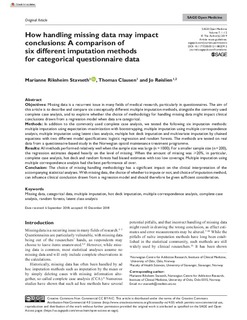| dc.contributor.author | Stavseth, Marianne Riksheim | |
| dc.contributor.author | Clausen, Thomas | |
| dc.contributor.author | Røislien, Jo | |
| dc.date.accessioned | 2020-02-17T14:13:13Z | |
| dc.date.available | 2020-02-17T14:13:13Z | |
| dc.date.created | 2019-09-26T14:16:02Z | |
| dc.date.issued | 2019-01 | |
| dc.identifier.citation | Stavseth, M.R., Clausen, T., Røislien, J. (2019) How handling missing data may impact conclusions: A comparison of six different imputation methods for categorical questionnaire data. SAGE Open Medicine, 7, 1-12. | nb_NO |
| dc.identifier.issn | 2050-3121 | |
| dc.identifier.uri | http://hdl.handle.net/11250/2642055 | |
| dc.description.abstract | Objectives:
Missing data is a recurrent issue in many fields of medical research, particularly in questionnaires. The aim of this article is to describe and compare six conceptually different multiple imputation methods, alongside the commonly used complete case analysis, and to explore whether the choice of methodology for handling missing data might impact clinical conclusions drawn from a regression model when data are categorical.
Methods:
In addition to the commonly used complete case analysis, we tested the following six imputation methods: multiple imputation using expectation–maximization with bootstrapping, multiple imputation using multiple correspondence analysis, multiple imputation using latent class analysis, multiple hot deck imputation and multivariate imputation by chained equations with two different model specifications: logistic regression and random forests. The methods are tested on real data from a questionnaire-based study in the Norwegian opioid maintenance treatment programme.
Results:
All methods performed relatively well when the sample size was large (n = 1000). For a smaller sample size (n = 200), the regression estimates depend heavily on the level of missing. When the amount of missing was ⩾20%, in particular, complete case analysis, hot deck and random forests had biased estimates with too low coverage. Multiple imputation using multiple correspondence analysis had the best performance all over.
Conclusion:
The choice of missing handling methodology has a significant impact on the clinical interpretation of the accompanying statistical analyses. With missing data, the choice of whether to impute or not, and choice of imputation method, can influence clinical conclusion drawn from a regression model and should therefore be given sufficient consideration. | nb_NO |
| dc.language.iso | eng | nb_NO |
| dc.publisher | SAGE Publishing | nb_NO |
| dc.relation.uri | https://journals.sagepub.com/doi/pdf/10.1177/2050312118822912 | |
| dc.rights | Navngivelse-Ikkekommersiell 4.0 Internasjonal | * |
| dc.rights.uri | http://creativecommons.org/licenses/by-nc/4.0/deed.no | * |
| dc.subject | medisinsk forskning | nb_NO |
| dc.title | How handling missing data may impact conclusions: A comparison of six different imputation methods for categorical questionnaire data | nb_NO |
| dc.type | Journal article | nb_NO |
| dc.type | Peer reviewed | nb_NO |
| dc.description.version | publishedVersion | nb_NO |
| dc.rights.holder | © The Author(s) 2019 | nb_NO |
| dc.subject.nsi | VDP::Medical disciplines: 700 | nb_NO |
| dc.source.pagenumber | 1-12 | nb_NO |
| dc.source.volume | 7 | nb_NO |
| dc.source.journal | SAGE Open Medicine | nb_NO |
| dc.identifier.doi | 10.1177/2050312118822912 | |
| dc.identifier.cristin | 1729648 | |
| cristin.unitcode | 217,13,2,0 | |
| cristin.unitname | Avdeling for kvalitet og helseteknologi | |
| cristin.ispublished | true | |
| cristin.fulltext | original | |
| cristin.qualitycode | 1 | |

